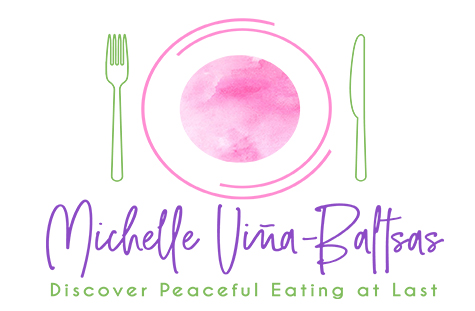Yours truly unapologetically savoring a snack in Italy this summer!
Have you ever heard, "Wow, you've got a big appetite!" or "Are you going to eat all that?"
I'm raising my hand because I have!
In fact, some of my most vivid childhood memories are when someone (mainly my mother) commented about how much food I had on my plate. I don't blame her because she was also a victim of diet culture, but nonetheless, I know that it negatively affected my relationship with food. I talk about this in my recent podcast interview with Chris Sandel of Seven Health.
Comments like these often make us feel shameful and embarrassed about how much food we desire and/or eat. In some cases, comments like this may even lead to rebellious eating.
Thanks to diet culture, we've been told that honoring our body's hunger cues is problematic.
Diet culture tells us that:
Eating is okay when it's only being used for fuel
Eating is okay when you only eat as much as you 'need'
Eating is okay provided you're eating only when you're physically hungry (or else it's considered gluttonous)
Eating shouldn't be used to help us soothe our emotions
Do you know what messages like this do?
They disrupt our ability to truly trust our bodies, specifically our hunger. A lack of body trust often makes us feel unsafe in our bodies. This lack of trust also interferes with our body sensations. So, our bodies may be giving us hunger signals but our minds will fight hard to override these cues because they've learned that not following the rules is bad, especially for women!
Don't be fooled and think that overriding these cues (which is also emotionally draining) means that you refrain from eating, although it may in extreme cases. How this usually plays out in our daily lives is,
Not eating as much food as the body actually needs for physical and emotional reasons
Not eating the foods that the body truly desires leading to feelings of dissatisfaction
More often than not, eating past a comfortable fullness
Increased stress and anxiety around food (which may cause digestive issues)
Increased fear of weight gain and thoughts of restricting
In the end, if we trusted our hunger as much as we trust our need to go to the bathroom, disordered eating wouldn't affect such a huge percentage of the population!
If you're someone who doubts, berates, or belittles themselves because they've been told or believe they eat 'too much', eat 'too often', or eat for the 'wrong reasons', that's all diet culture conditioning that can be unlearned.
Despite what diet culture dictates, our bodies know what they need, and they can be trusted! Keep tuning in, honoring your body’s cues, and unapologetically savoring every bite and wait for ‘magic’ to unfold.
Want eating and body image to be easier? I know I can help.




